How to create a relapse prevention plan for long-term success

Understanding the Significance of Relapse Prevention
Long-term success in overcoming addiction hinges on effective relapse prevention strategies. Developing a personalized, comprehensive relapse prevention plan empowers individuals to navigate the challenging journey of recovery, helping to identify triggers, establish coping mechanisms, and leverage support networks. Recognizing relapse as a process with distinguishable stages allows for early intervention, thereby reducing the likelihood of full relapse and fostering sustained sobriety.
The Core Elements of a Personalized Relapse Prevention Plan
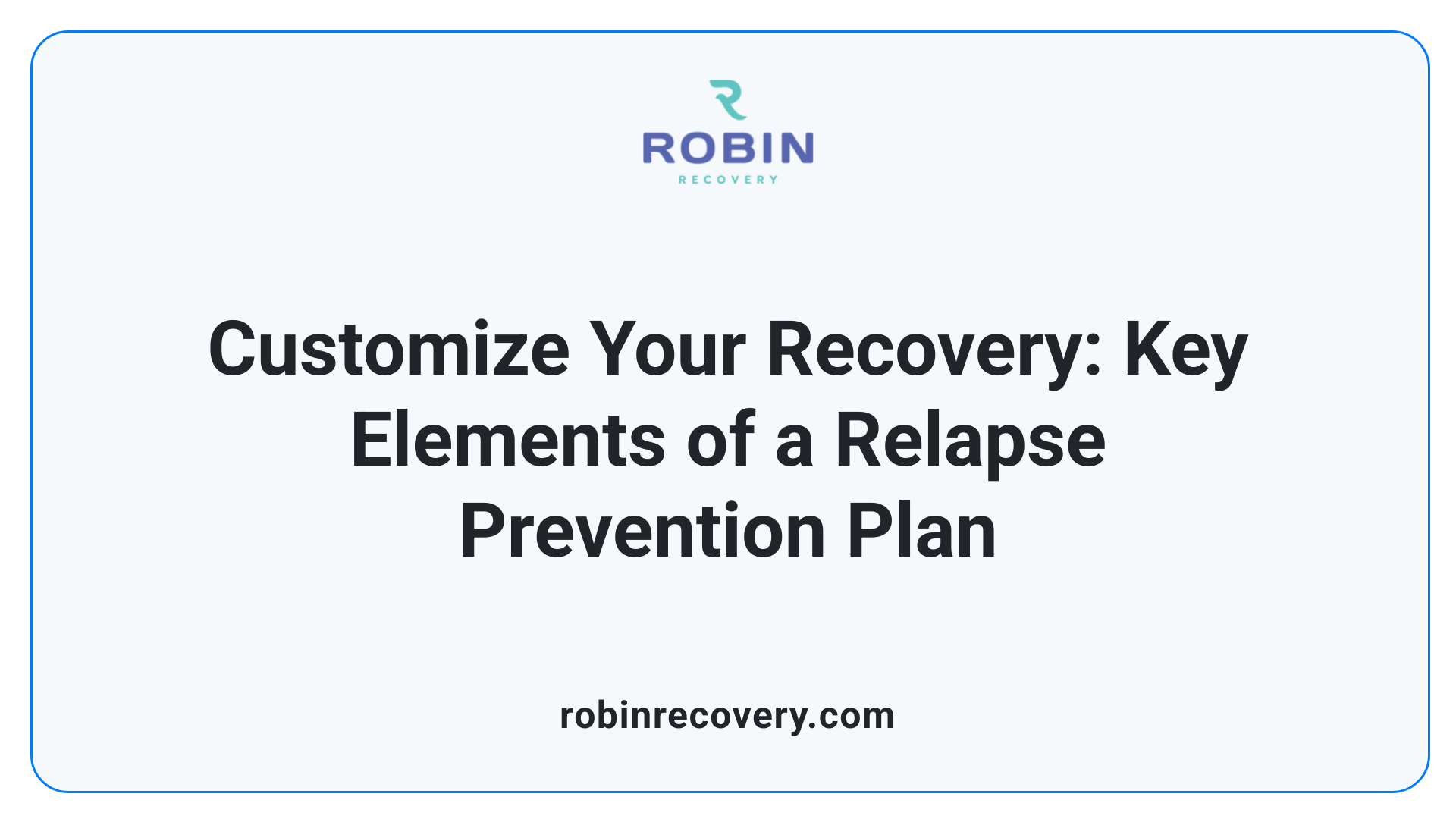
What are the key components of an effective relapse prevention plan?
An effective relapse prevention plan is a vital tool for maintaining long-term recovery from substance use. It is highly personalized, reflecting the individual's specific circumstances, triggers, and motivations.
A central element involves identifying personal triggers and warning signs. These may include emotional states such as stress, anger, or sadness, as well as external cues like familiar places or people associated with past substance use. Recognizing early signs—such as changes in mood, behavior, or thought patterns—allows for timely intervention before a full relapse occurs.
Developing coping strategies is equally important. These tactics address cravings and high-risk situations, enabling individuals to manage their urges effectively. Common techniques include engaging in physical activity, practicing mindfulness or meditation, calling supportive friends or sponsors, journaling, or participating in hobbies. Preparing for situations like social gatherings with substance use or emotional distress helps build resilience.
Support networks and professional help are foundational. Maintaining contact with trusted individuals—family, friends, sponsors, or mental health professionals—provides accountability and immediate assistance during challenging moments. Regular therapy sessions, such as cognitive-behavioral therapy (CBT), reinforce behavioral change and reinforce coping skills.
Setting concrete recovery goals helps sustain motivation. These targets may include maintaining employment, restoring relationships, improving health, or cultivating new hobbies. Measuring progress toward these goals boosts confidence and reinforces commitment.
To ensure ongoing progress, the plan should be reviewed regularly. Monitoring effectiveness through self-assessment, drug testing, or reflecting on successes and setbacks allows adaptation as his or her circumstances evolve. Updating the plan accordingly ensures it remains relevant and practical.
A comprehensive relapse prevention plan combines awareness, action, support, and flexibility. By addressing all these areas, individuals are better equipped to navigate their recovery journey with confidence and resilience.
Stages of Relapse and the Importance of Early Intervention
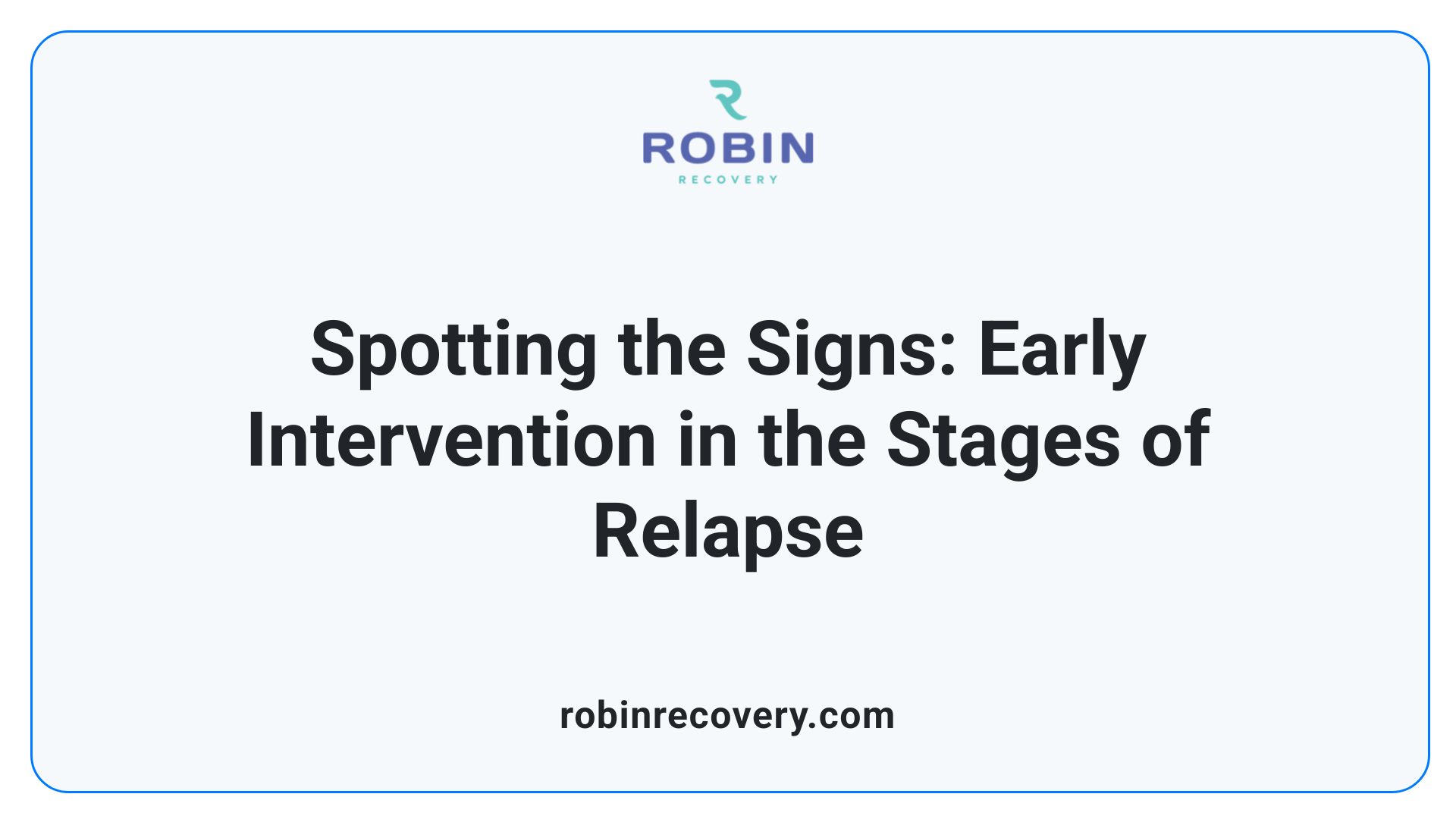
What are the stages of relapse and how can intervention techniques be used to prevent relapse?
Relapse in addiction recovery typically unfolds through three interconnected stages: emotional, mental, and physical relapse. Understanding each stage is vital for timely intervention and sustained sobriety.
Emotional relapse acts as the first warning sign. During this phase, individuals often experience mood swings, feelings of isolation or loneliness, poor sleep, and neglect of self-care routines. These emotional states serve as early precursors to relapse. To prevent escalation at this stage, strategies such as practicing self-awareness, sharing feelings with trusted support persons, engaging in self-care activities like exercise and hobbies, and maintaining a healthy routine are crucial.
Progressing into mental relapse, individuals grapple with intense cravings, rationalizations, and planning to return to substance use. Sometimes, their internal dialogue includes justifications for use, such as stress relief or social reasons. To intervene, techniques such as visualization of negative consequences, seeking immediate support from sponsors or therapists, and employing relaxation or mindfulness methods can help manage these urges.
Physical relapse occurs when substance use resumes, often after warning signs have been ignored or unaddressed. Signs include behavioral changes, secretive actions, or physical symptoms related to substance intake. Prevention at this stage involves ongoing engagement with therapy, medication adherence, and strong support systems. Monitoring tools like drug screens or participation in support groups serve as deterrents and early detectors.
Recognizing that relapse is a process rather than a single event allows individuals and their support teams to implement targeted interventions at each stage. By doing so, the risk of full relapse diminishes significantly, fostering long-term recovery and resilience.
Managing Triggers and High-Risk Situations Effectively
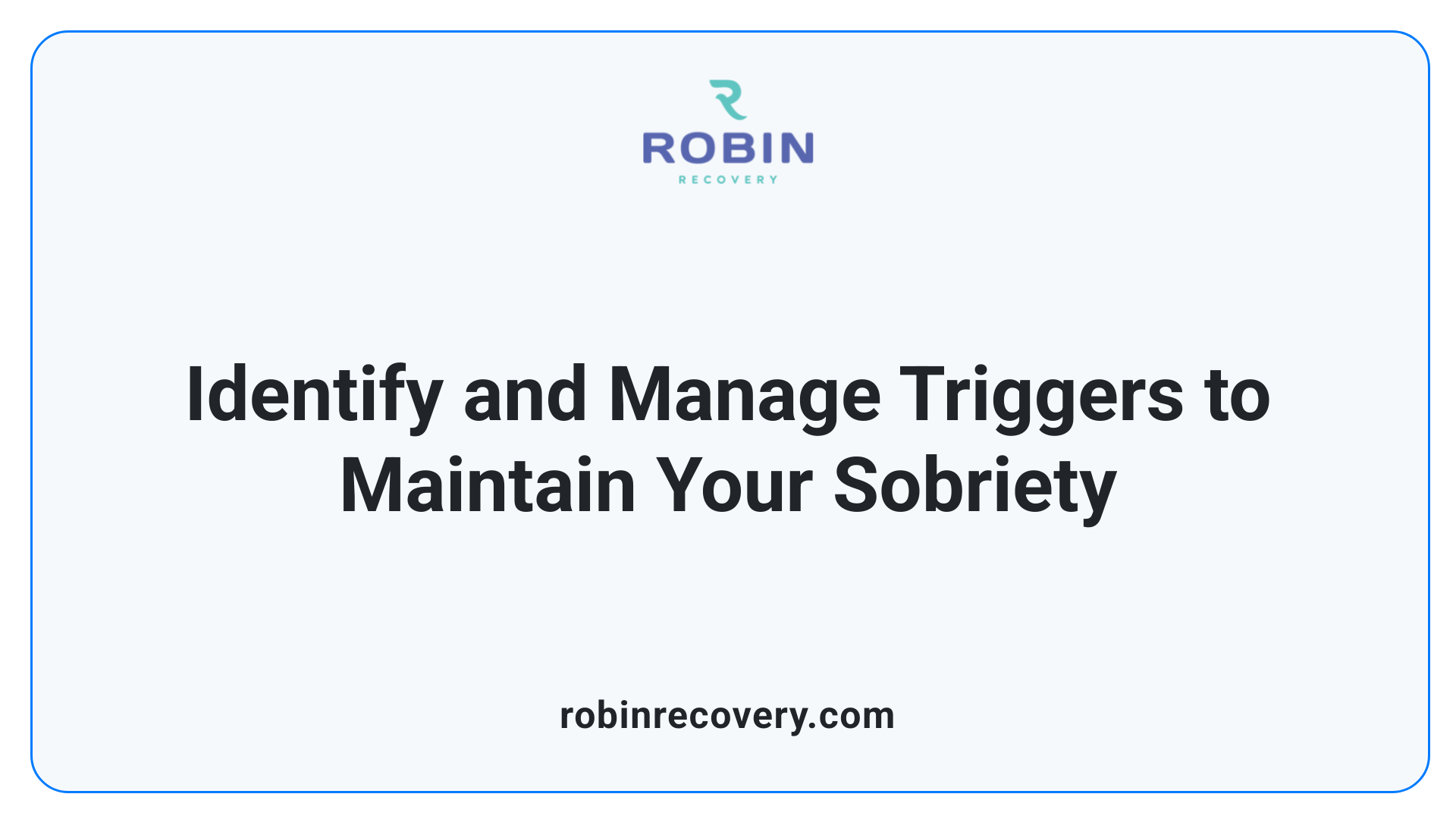
How can one identify and manage relapse triggers and high-risk situations?
Recognizing the specific circumstances that lead to substance use is essential for effective relapse prevention. Individuals should become aware of internal triggers such as emotional states—like stress, anger, boredom, or anxiety—and external triggers including social settings, specific environments, or certain people associated with past substance use.
To manage these high-risk situations, developing personalized coping strategies is crucial. These may include mindfulness practices, relaxation techniques, assertiveness training, or engaging in healthy distractions like hobbies or physical activity. Building confidence in handling these triggers through gradual goal setting enhances self-efficacy, making it easier to navigate difficult moments.
Creating a detailed relapse prevention plan is beneficial. This plan should include stimulus control measures, such as removing drug paraphernalia or avoiding certain places and social circles linked to past use. Recognizing early warning signs—like mood swings or increased cravings—allows for timely intervention.
Cognitive restructuring techniques help reframe lapses as learning opportunities rather than failures, fostering a positive mindset that supports ongoing sobriety. Involving a strong support network, including recovery groups, family, and friends, offers ongoing encouragement and accountability.
Regularly reviewing and updating coping strategies as needed ensures resilience and adaptability. Education about relapse triggers and warning signs further empowers individuals to act promptly and effectively, reducing the likelihood of a full relapse.
In summary, identifying internal and external cues, employing personalized coping methods, controlling environmental stimuli, and strengthening support systems are vital steps in managing triggers and avoiding high-risk situations during recovery.
The Role of Professional Support and Community in Sustaining Sobriety
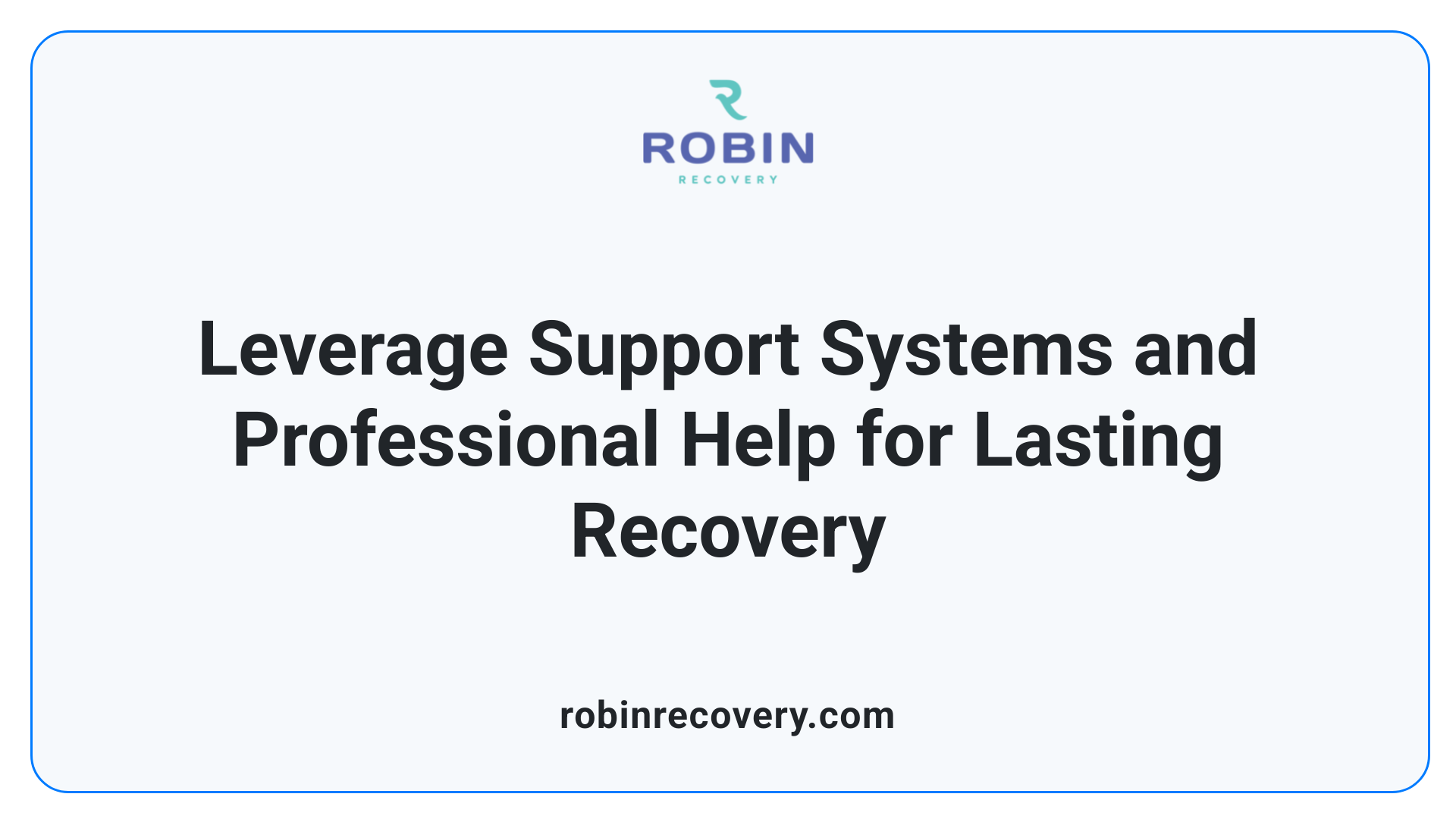
What role do professional treatment and support systems play in relapse prevention?
Professional treatment and support systems are fundamental in helping individuals maintain sobriety by addressing various challenges of addiction recovery. These systems offer personalized interventions tailored to each person's unique needs, including psychotherapy, medication, and ongoing monitoring.
Therapies like cognitive-behavioral therapy (CBT) and motivational interviewing equip individuals with vital skills to handle cravings, emotional distress, and triggers. Medications such as disulfiram, naltrexone, and methadone help decrease the likelihood of relapse by managing withdrawal symptoms and reducing cravings.
Monitoring tools like urine drug screens and breathalyzers serve as deterrents and early warning aids, enabling timely intervention.
Support from family, friends, and peer groups like Alcoholics Anonymous (AA), Narcotics Anonymous (NA), and SMART Recovery fosters a sense of community. These groups provide social support, accountability, and shared experiences, which are critical for long-term recovery.
Structured aftercare programs and recovery facilities incorporate ongoing therapy, group meetings, and social activities that help sustain progress, especially during vulnerable periods.
Emerging, innovative approaches like transcranial magnetic stimulation (TMS) and novel medical therapies are also being explored to enhance recovery efforts.
Overall, combining professional treatment with supportive community involvement creates a comprehensive safety net that encourages resilience and reduces relapse risks. This integrated approach helps individuals develop coping strategies, rebuild relationships, and establish a balanced, substance-free life.
Treatment Type Description Additional Insight Psychotherapy CBT, motivational interviewing for coping skills Moderate to high effectiveness Medications Disulfiram, naltrexone, methadone for managing cravings Evidence-based for addiction maintenance Monitoring Tools Drug screens, breathalyzers Early warning and deterrence Support Groups AA, NA, SMART Recovery Fosters community and accountability Innovative Treatments TMS, hallucinogenic agents Promising but experimental
In summary, the blend of professional healthcare interventions and community engagement forms the backbone of effective relapse prevention, offering individuals the best chance for sustained recovery.
Creating Supportive Environments and Establishing Healthy Routines
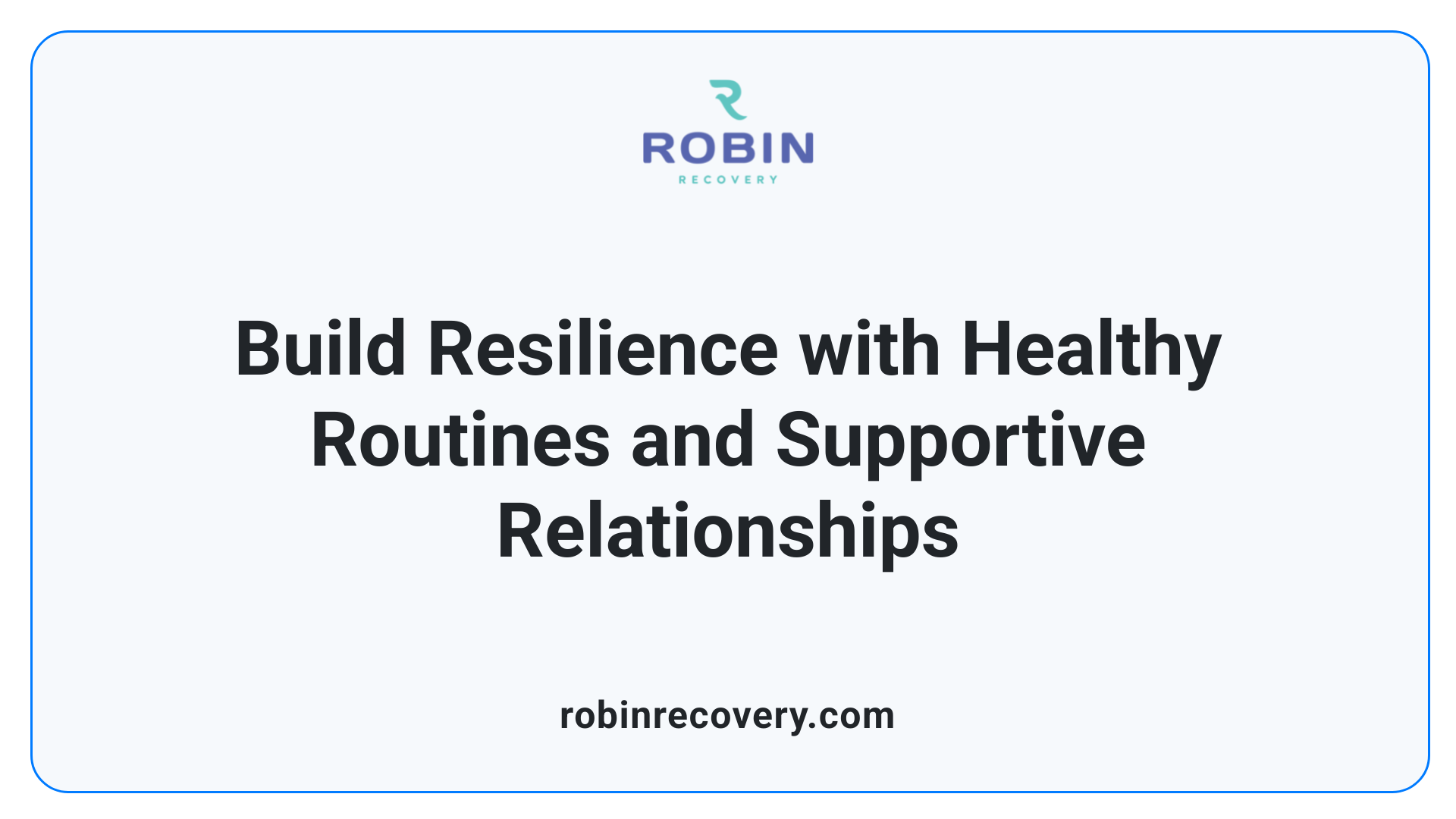
A stable daily routine plays a vital role in relapse prevention by providing structure and predictability, which help reduce stress and impulsive behaviors that can lead to substance use. Incorporating consistent self-care activities like balanced nutrition, regular exercise, and sufficient sleep not only improve physical health but also strengthen emotional resilience.
Developing supportive relationships is equally important. Connecting with friends, family, sponsors, or peer support groups fosters a sense of belonging and accountability. These connections provide encouragement during challenging times and help individuals recognize early warning signs of relapse, such as cravings or mood swings.
Avoiding high-risk environments and triggers is a proactive strategy. This includes steering clear of social settings or places associated with past substance use, and being mindful of emotional states that may trigger cravings. Strategies like planning alternative activities or attending sober social events can help maintain a substance-free lifestyle.
Using routines to reinforce sobriety involves establishing daily habits that promote mental and physical well-being. Examples include morning meditation, scheduled therapy sessions, participation in support group meetings, and engaging in hobbies. These routines serve as constant reminders of recovery goals, helping to normalize sobriety and build resilience against relapse.
Practical implementation of a relapse prevention plan involves personalized goal setting—such as improving health or rebuilding relationships—and developing specific coping strategies. Techniques like mindfulness, grounding exercises, or SOBER meditation are effective in managing emotional and mental triggers. Maintaining a support network allows immediate assistance when cravings occur.
Regular review and adjustment of the plan, including tools like urge surfing or relapse prevention wallet cards, help keep strategies relevant and effective. Continuous professional support and participation in ongoing therapy also contribute to long-term success.
Creating an environment where positive habits are ingrained and support systems are strong establishes a foundation for sustained recovery. These routines and relationships act as protective barriers, reducing the likelihood of relapse and fostering a fulfilling, sober lifestyle.
Sustaining Motivation and Long-term Commitment
Why is maintaining motivation and long-term commitment important in sobriety, and how can it be supported?
Long-term sobriety hinges on ongoing motivation and commitment. These elements are crucial because they provide the resilience needed to navigate inevitable challenges, reduce the risk of relapse, and help individuals work towards meaningful life objectives.
Supporting sustained motivation involves multiple strategies. Celebrating milestones and progress, no matter how small, reinforces positive behavior and builds confidence. Setting achievable, short-term goals helps maintain focus and provides frequent feelings of accomplishment. Establishing a strong support system, including family, friends, mentors, and peer groups, offers accountability and encouragement.
Developing structured routines that incorporate self-care activities like exercise, proper nutrition, mindfulness, and reflection helps reinforce commitment. Regularly revisiting personal reasons for sobriety can rekindle motivation during tough times. Recognizing early signs of waning motivation, such as feelings of complacency, boredom, or emotional distress, allows for timely intervention.
Perseverance is essential. Embracing relapse as a learning experience rather than a failure can foster resilience. Internal drive shaped by personal values—such as health, relationships, or self-improvement—combined with external support, creates a sustainable foundation for long-term recovery.
In sum, ongoing motivation is cultivated through celebration, goal setting, support, routine, and self-awareness, all working together to foster enduring commitment to sobriety.
The 5 D's Technique in Managing Cravings
When managing cravings, particularly during addiction recovery, employing specific strategies can make a significant difference. One effective method is the 5 D's technique, designed to help individuals respond constructively to urges to relapse.
The first step is to Delay. When a craving hits, it's crucial to postpone making any decision or action related to substance use. This moment of pause can prevent impulsive behavior and provide room to employ other coping strategies.
Next, Drink water. Hydration is often overlooked but can be helpful in reducing the intensity of cravings. Drinking water not only helps flush out toxins but also creates a feeling of fullness, making it easier to resist the urge.
Distract yourself with engaging activities. Activities like walking, listening to music, doodling, or engaging in hobbies divert your attention away from the craving, helping to break the cycle of obsessive thoughts about substance use.
Deep breathing exercises are also valuable. Practicing slow, mindful breaths can reduce stress hormones and calm the nervous system, alleviating the emotional triggers that often accompany cravings.
Lastly, Discuss your feelings with a supportive person—such as a sponsor, counselor, family member, or friend. Talking about your urges can reinforce your motivation to stay sober, provide reassurance, and help you gain perspective on managing difficult moments.
Using the 5 D's consistently empowers individuals to handle cravings effectively, reducing the risk of relapse and supporting long-term recovery.
Committing to Long-Term Sobriety through Effective Planning
Creating a relapse prevention plan is a vital step toward achieving and maintaining long-term sobriety. It requires honest self-assessment, personalized strategies, and ongoing support. Regularly revisiting and updating the plan, along with building a strong network of encouragement, helps individuals stay resilient in the face of challenges. Recognizing relapse as a process that can be intercepted at various stages, especially through early identification of triggers and warning signs, is key. By integrating these elements into daily routines, fostering motivation, and leveraging professional and community support systems, individuals can significantly increase their chances of lasting recovery and a healthier, substance-free life.
References
- Addiction Relapse Prevention - StatPearls - NCBI Bookshelf
- [PDF] Relapse Prevention Plan
- Relapse Prevention Plans - CSG Justice Center
- How to Write a Bulletproof Relapse Prevention Plan - River Oaks
- 3 Examples of a Relapse Prevention Plan | Addiction Treatment
- Relapse Prevention: Tips for Achieving Long-Term Recovery
- Roadmap to Long-Term Sobriety: Making a Relapse Prevention Plan
